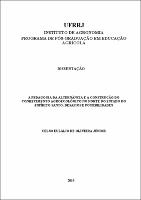Use este identificador para citar ou linkar para este item:
http://rima.ufrrj.br/jspui/handle/20.500.14407/12725| Tipo do documento: | Dissertação |
| Título: | A Pedagogia da alternância e a construção do conhecimento agroecológico no norte do estado do Espírito Santo: desafios e possibilidades. |
| Título(s) alternativo(s): | The pedagogy of alternation and the construction of agroecological knowledge in the north of Espírito Santo state: challenges and possibilities. |
| Autor(es): | Oliveira Júnior, Celso Eulálio |
| Orientador(a): | Carvalho, Igor Simoni Homem de |
| Primeiro membro da banca: | Carvalho, Igor Simoni Homem de |
| Segundo membro da banca: | Gregorio, Sandra Regina |
| Terceiro membro da banca: | Lima, Viviane Cristina Silva |
| Palavras-chave: | Agroecologia;Ceffa;Educação do Campo;Mepes;Raceffaes;Agroecology;Ceffa;Field education;Mepes;Raceffaes |
| Área(s) do CNPq: | Agronomia Educação |
| Idioma: | por |
| Data do documento: | 28-ago-2019 |
| Editor: | Universidade Federal Rural do Rio de Janeiro |
| Sigla da instituição: | UFRRJ |
| Departamento: | Instituto de Agronomia |
| Programa: | Programa de Pós-Graduação em Educação Agrícola |
| Citação: | OLIVEIRA JÚNIOR, Celso Eulálio de. A Pedagogia da Alternância e a construção do conhecimento agroecológico no norte do estado do Espírito Santo: desafios e possibilidades. 2019. 212 f. Dissertação (Mestrado em Educação Agrícola) – Instituto de Agronomia, Universidade Federal Rural do Rio de Janeiro, Seropédica, 2019. |
| Resumo: | O surgimento e avanço do agronegócio sobre o norte do estado do Espírito Santo provocou profundas transformações ambientais, sociais, políticas e econômicas no território capixaba, as quais resultaram na organização de diversas pessoas que, por meio de iniciativas individuais e coletivas, através de organizações, movimentos sociais e profissionais, buscaram alternativas para contrapor esse sistema. Nesse sentido, o movimento que inicia com base nas agriculturas alternativas, principalmente nos anos 1980, avança para a Agroecologia no final de 1990, e, desde então, ela vem se despontando como uma possibilidade para superação do sistema hegemônico, amplamente instalado no território. Os Centros Familiares de Formação em Alternância (Ceffas) têm sido um importante parceiro dos camponeses, contribuindo historicamente com suas lutas, e sendo importante formador de lideranças e praticantes da Agroecologia, haja vista que grande parte desses, em algum momento de sua vida, estabeleceu algum tipo de relação com essas escolas. Contudo, nos últimos anos, alguns questionamentos têm aparecido sobre a efetiva contribuição das escolas de ensino médio que ofertam o curso técnico em agropecuária, na construção do conhecimento agroecológico. Dessa forma, com o presente estudo, buscamos aprofundar essas questões, procurando investigar a relação existente entre essas escolas e a construção do conhecimento agroecológico. Para isso, apoia-se nos pressupostos da pesquisa-ação, que possibilitou uma pesquisa participativa, envolvendo através da Raceffaes, os representantes das famílias e dos/as educadores/as das escolas e, por meio da Articulação Capixaba e Agroecologia, com as organizações sociais do campo que se relacionam com a Agroecologia. Os resultados alcançados demostram que os Ceffas nem sempre possuíram uma proposta alternativa em relação à agricultura, mas que sempre estiveram comprometidos com as causas camponesas e com o desenvolvimento humano. A partir de seu envolvimento com a agricultura alternativa, principalmente com a agricultura entre os anos de 1980 a até meados dos anos 1990, e depois com a Agroecologia ao final dos anos 1990, as escolas pesquisadas, apesar dos desafios enfrentados na dimensão política e pedagógica, estão buscando fortalecer sua práxis agroecológica, fortalecendo a sua construção nos territórios onde estão inseridas e contribuindo para a superação do capitalismo. |
| Abstract: | The emergence and advancement of agribusiness in the north of Espírito Santo state has brought about profound environmental, social, political and economic transformations in its territory. This caused the organization of several people who, by means of individual and collective initiatives through organizations, social and professional movements, sought alternatives to oppose this system. In this sense, the movement that started with alternative agriculture, especially in the 80's, shifted to agroecology in the end of 1990 and since then, it has been emerging as a possibility to overcome the hegemonic system widely installed in the territory. Historically, the Ceffas Family Training Centers have been an important partner of peasants by contributing to their struggles and by being an important educator of leaders and practitioners of agroecology - since many of them, at some point in their life, established some kind of relationship with these schools. However, in the last few years, some questions have arisen regarding the actual contribution of secondary schools that offer technical courses in agriculture and livestock, in the construction of agroecological knowledge. Thus, with the present study, we seek to deepen these questions, aiming to investigate the relationship between these schools and the construction of agroecological knowledge. To this end, we relied on action research, which enabled a participatory research involving, through Raceffaes, the representatives of the families and the educators of the schools and, through the ACA, the rural social organizations that relate to agroecology. The results show that Ceffas have not always had an alternative proposal regarding agriculture, but have always been committed to peasant causes and human development. From their involvement with alternative agriculture, especially with agriculture between the 1980s and the mid-1990s, and then with agroecology at the end of those years, the surveyed schools, despite the challenges faced in the political and pedagogical dimensions, are seeking to strengthen their agroecological praxis, strengthening their construction in the territories where they are inserted and contributing to overcome capitalism. |
| URI: | https://rima.ufrrj.br/jspui/handle/20.500.14407/12725 |
| Aparece nas coleções: | Mestrado em Educação Agrícola |
Se for cadastrado no RIMA, poderá receber informações por email.
Se ainda não tem uma conta, cadastre-se aqui!
Arquivos associados a este item:
| Arquivo | Descrição | Tamanho | Formato | |
|---|---|---|---|---|
| 2019 - Celso Eulálio de Oliveira Júnior.pdf | 2019 - Celso Eulálio de Oliveira Júnior | 2,78 MB | Adobe PDF |  Abrir |
Os itens no repositório estão protegidos por copyright, com todos os direitos reservados, salvo quando é indicado o contrário.

